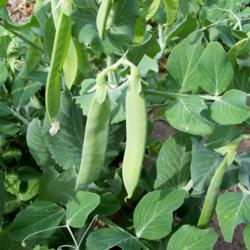
With the turning of the calendar to September, most gardeners begin to think of wrapping up the gardening season. However, for industrious gardeners there is still time to plant a number of veggies to harvest before the final freeze. While northern gardeners may be limited to planting lettuce, arugula, radishes, and spinach in September, Southern and Western gardeners in areas where frost isn't expected until November or December have the luxury of being able to plant a wider array of vegetables.
Fall carrots and peas are two crops to plant now in warmer regions for a fall harvest. Both crops will mature in a few months after planting, they will tolerate a light frost and thrive during the cool, and hopefully moist but not too wet, fall. Both crops can be harvested while still immature to yield some tasty vegetables if the temperatures dip earlier than expected.
If you live in a mild winter climate, you can also try growing overwintering varieties of carrots that are planted in fall for harvesting the following spring.
Here's how to grow crops of carrots and peas this fall in your garden.
Carrot and Pea VarietiesChoose carrot and pea varieties that grow quickly to insure they are a mature size before the days grow too short and temperatures grow too cold for further growth. Here are some good carrot varieties to try.
'Red Cored Chantenay' - Maturing 68 days after seeding, this 6-inch-long blocky carrot is adaptible to many soil types.
'Primo' - This very early Nantes-type carrot matures 60 days from seeding and colors up early so it's good harvested as a baby carrot.
'Little Finger' - This midget variety produces 3- to 4-inch-long roots that color up quickly and mature 65 days after seeding.
'Merida' - This 7-inch-long Nantes-type carrot can be planted in fall for a spring harvest. It is slow to bolt in spring.
For fall peas, it's best to select varieties with flat pods or early maturing edible-pods. Even if the peas don't completely form before a killing freeze, the pods that are already developed are still edible. Some good pea varieties to grow in fall include the following.
'Early Snap' - This 'Sugar Snap' pea produce pods in less than 60 days from seeding. Vines grow 2 to 3 feet tall.
'Mammoth Melting Sugar' - This 4-inch-long, flat-podded snow pea is productive and early, maturing within 70 days.Vines grow 5 feet tall and need trellising.
'Alaska' - This smooth-seeded variety is mostly grown for its seeds that are good in soups and for canning, but since it matures in 56 days, it is a good one to try for fall. Vines grow 3 feet tall.
'Dwarf Gray Sugar Pod' - This heirloom produces flat-podded snow peas 60 days after seeding on 3-foot-tall plants.
Growing Fall CarrotsIn warm areas of the South and West, plant fall carrots in September in raised beds. Prepare the bed by removing previous crops and weeds, loosening the soil, and amending it with a 1/2-inch-thick layer of compost. Work the compost into the soil. Sprinkle the carrot seed on top of the smoothed seed bed and cover with a 1/4-inch-thick layer of sand, potting soil, or sifted topsoil. Water well. Since it may still be warm in many areas in September, shade the planting bed with a shade cloth during 90-degree days and keep the soil evenly moist. If the soil dries out or becomes too hot, the seed won't germinate well.
Once the tops have grown a few inches tall, thin the carrots to 2 inches apart. Three weeks later, thin again to 3 to 4 inches apart. Fertilize after the first thinning with a quick-acting, complete fertilizer, such as 5-10-10. Avoid using high-nitrogen fertilizers or fresh manure.
Start harvesting as soon as the carrots show color. To overwinter carrots, mulch with a 6- to 8-inch-thick layer of hay or straw before the ground freezes. Pull back the straw to harvest carrots through the winter and into spring.
Growing Fall PeasPeas thrive in cool fall weather. Prepare the soil by removing weeds, rocks, and old plants. Amend the soil with a 1/2-inch-thick layer of compost, and sow rows of peas along a fence if the variety requires trellising. Keep the soil evenly moist and cool with frequent waterings but don't overwater young pea plants or they will rot. Lay a straw mulch around germinated pea plants to keep the soil evenly moist.
Start harvesting your peas as soon as the pods reach a mature size. If a killing frost threatens, pick the pods when they're small or protect the planting with a floating row cover. If there are pea vines that haven't formed pods, consider harvesting the top 4 inches of the pea shoots for a tasty addition to salads and stir fries.
QUESTION OF THE WEEKHollow Heart of Potato
Q. Most of my white potatoes grew beautifully this year. But the larger ones were hollow in the middle when I cut them open. What happened?
A. Your potatoes have hollow heart, a physiological disorder caused by uneven growth. Fluctuating soil temperatures and moisture are most often to blame. Hollow heart is mostly found on large tubers, so next year plant your spuds 8 inches apart instead of the normal 12 inches, to produce smaller tubers. Adding organic matter to the soil, mulching with 4 to 6 inches of hay or straw, and adding at least 1 inch of water per week will ensure healthy tuber growth.
 Charlie Nardozzi is an award winning, nationally recognized garden writer, speaker, radio, and television personality. He has worked for more than 30 years bringing expert gardening information to home gardeners through radio, television, talks, tours, on-line, and the printed page. Charlie delights in making gardening information simple, easy, fun and accessible to everyone. He's the author of 6 books, has three radio shows in New England and a TV show. He leads Garden Tours around the world and consults with organizations and companies about gardening programs. See more about him at Gardening With Charlie.
Charlie Nardozzi is an award winning, nationally recognized garden writer, speaker, radio, and television personality. He has worked for more than 30 years bringing expert gardening information to home gardeners through radio, television, talks, tours, on-line, and the printed page. Charlie delights in making gardening information simple, easy, fun and accessible to everyone. He's the author of 6 books, has three radio shows in New England and a TV show. He leads Garden Tours around the world and consults with organizations and companies about gardening programs. See more about him at Gardening With Charlie.
 Victory Seed Company has all the seeds you want for your best garden in 2024.
Victory Seed Company has all the seeds you want for your best garden in 2024.
For 25 years, the family-owned Victory Seed Company has provided the highest quality vegetable, herb and flower seeds to families across the country. We are passionate about providing you the best seeds available that give excellent germination, robust plants, and the harvest you want. With a catalog of over a thousand varieties, we have everything, and our prices are the kinds that we'd want to pay. We have hundreds of yesterday's heirloom vegetables, as well as today's award winning hybrid selections. Get to know us by visiting our website and browsing through our online vegetable seed catalog.